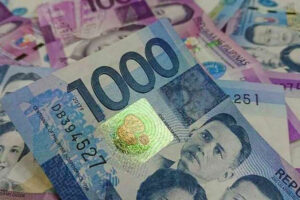EMERGING MARKETS (EM) like the Philippines will be able to tap into debt markets and further cut rates amid improved liquidity conditions due to the US central bank’s easing cycle, Fitch Ratings said.
“The turn of the global interest rate cycle, underlined by the US Federal Reserve’s 50-basis-point (bp) Federal Funds target rate cut in September, should ease foreign-currency debt repayment burdens and refinancing challenges for many emerging market (EM) issuers,” it said in a report.
The Fed’s rate-cutting cycle is seen to “encourage investment-grade (IG) EM issuers that have favorable access to debt markets to take advantage of improved liquidity conditions.”
“Sovereigns such as China, Indonesia, Peru and the Philippines were among those issuing foreign-currency debt in the third quarter, for example,” it added.
Latest data from the central bank showed external debt payments declined by 7.6% to $7.693 billion in the first seven months from $8.329 billion in the same period a year ago.
Outstanding external debt hit a record $130.182 billion at the end of June, separate data showed.
This year so far, the National Government has raised $2 billion from the issuance of US dollar-denominated dual-tranche global bonds in May, and another $2.5 billion in August from triple-tranche dollar bonds.
Fitch Ratings expects the US central bank to cut by another 25 bps each in November and December, as well as a total of 100 bps worth of cuts in 2025.
“Lower rates in key developed markets (DMs) should reduce global benchmark borrowing costs, easing liquidity and funding conditions for EM borrowers, particularly those with high dependence on foreign-currency debt,” it said.
“However, for many borrowers marginal borrowing rates in 2025 may still be higher than their current effective cost of borrowing, implying overall interest costs could still rise.”
The Fed launched its easing cycle in September with a 50-bp cut, bringing the Fed funds rate to the 4.75%-5% range.
The credit rater said that looser US monetary policy will also “create additional space for domestic monetary easing in many EMs — particularly in those economies whose currencies are managed against or pegged to the US dollar.”
“This will provide support to EM economic growth prospects, as well as reducing repayment burdens for those issuers that have borrowed on domestic debt markets,” it said.
“Nevertheless, lower rates may hit net interest margins and earnings for EM banks, depending on individual banks’ sensitivity to interest-rate movements.”
Fitch Ratings sees most EM central banks to further reduce policy rates as the Fed makes its own cuts in the fourth quarter and until next year.
Bangko Sentral ng Pilipinas (BSP) Governor Eli M. Remolona, Jr. has signaled a possibility of another 25-bp rate cut at the Monetary Board’s Dec. 19 meeting, its last for the year.
The BSP chief also brought up the possibility of up to 100 bps worth of cuts in 2025.
The Monetary Board has reduced rates by 50 bps this year so far, bringing the key rate to 6%. It began its easing cycle in August, the first time it lowered borrowing costs in nearly four years. — Luisa Maria Jacinta C. Jocson
